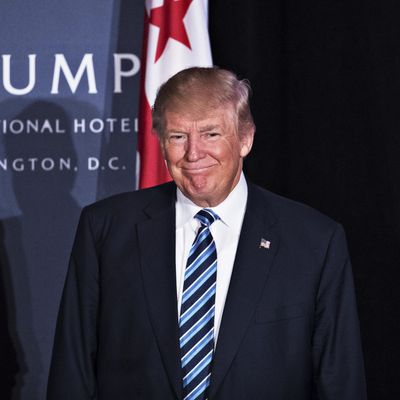
Less than a week after Donald Trump won the White House, the federal government took a key step toward providing the president-elect’s company with a tax subsidy that could be worth as much as $32 million, BuzzFeed News reported on Wednesday.
That “Historic Rehabilitation Tax Credit” would be Trump’s reward for developing his new luxury hotel within the bones of D.C.’s Old Post Office Pavilion. On November 14, the National Park Service finalized the second phase of a three-step approval process that would provide an entity owned by Trump and his children with a credit worth 20 percent of the cost of the rehabilitation, which the mogul has estimated at $160 million.
Before Trump submits the third part of his application, he will likely have the opportunity to appoint the new director of the National Park Service — a circumstance that fits the textbook definition of a conflict of interest.
The copious opportunities for corruption that Trump will enjoy upon taking the Oval Office are most visible at the Trump International Hotel D.C. It’s there that foreign diplomats are already bidding up room rates to curry favor with the president-elect, and where Bahrain has decided to host a reception for the anniversary of its king’s ascension to the throne.
And it’s one place where Trump may actually be legally liable, if he choses to ignore the advice of leading White House ethicists, and retains ownership of his company, while ceding operational control to his children.
To develop his hotel in a historic post-office building owned by the government, Trump leased the property from the Government Services Administration — another federal agency whose leader he will soon be able to select. One term of that lease reads, “No … elected official of the Government of the United States … shall be admitted to any share or part of this Lease, or to any benefit that may arise therefrom[.]”
Steven L. Schooner and Daniel I. Gordon, a pair of experts in federal procurement, explained why this stipulation was so necessary:
The Old Post Office lease is a particularly complicated and, for GSA, rather unusual, 60-year agreement that requires significant annual disclosure of detailed financial information. These extensive disclosures are followed by negotiations over escalation of the rent and any other payments that the Trump Organization must pay to the government. Just imagine GSA pressing the Trump organization for more detailed revenue and expense information, or the President’s children negotiating annual rent adjustments with a career civil servant who reports to the GSA administrator appointed by their father, who serves at his pleasure. Any reasonable person would worry about the undue pressures and the inherent risk of favoritism that the government might show to such a well-connected contractor …
This problem would hardly be resolved if Trump transferred control and ownership of the property onto his children, the authors contend, since, so long as the building remains in the president’s family, “[t]he GSA employees handling the Trump lease will be caught between their duty to protect the interests of the building’s landlord—that is, the government, the public, and the taxpayers—and their duty of loyalty to the GSA administrator, who will be appointed by, and serve at the pleasure of then-President Trump.”
Trump’s authority over the National Park Service — as it processes his application for $32 million — would produce the same basic concern.
On Wednesday morning, Trump promised to “leave his business,” so as to put to rest any appearance of conflicts of interest. But he left the precise meaning of that promise unspecified. And subsequent reporting has indicated that Trump intends to pass off the company to his children — who have also served as members on his administration’s transition team.
It’s worth noting that the question of whether Trump qualifies for his desired tax credit isn’t an idle one. It’s not clear he has been entirely honest in his dealings with the federal government on the hotel project.
To win the right to develop a hotel in a government-owned building, Trump had to outbid several competing hotel chains.
According to BuzzFeed News, Trump won that competition by promising to employ an architect “who had, over decades, championed the building’s careful, historic restoration.”
After the contract was signed, Trump announced that the architect would no longer be involved. And once the credit came through, he pursued a variety of design and decorative changes that contravened the principles of historic preservation, including festooning the building’s grand lobby with gold leaf.






























